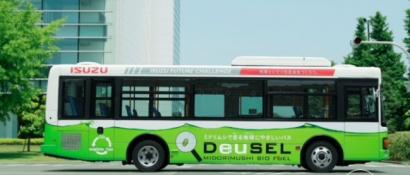
Euglena has achieved certification against the standard for its farm producing microalgae on Ishigaki island in Okinawa, Japan, following an audit by Amita, an independent third-party Conformity Assessment Body (CAB). The certification means that Euglena. is minimizing the environmental impacts of its farm, and operating in a way that is beneficial to workers and local communities.
The company mainly produces two species of microalgae, known as /Euglena/ and /C//hlorella,/ at its on-shore production facility in Ishigaki, and researches and promotes a number of uses for the micro-organisms containing various nutrients such as vitamins and amino acids.
Euglena is researching the use of oil extracted from the microalgae as jet and diesel fuel, with plans for producing and supplying them for practical use in commercial aviation and public transport, demonstrating the many and varied uses of algae products.
“This is an important milestone after a great deal of hard work and close collaboration between ASC and MSC, and I’d like to congratulate Euglena on itsachievement,” said Chris Ninnes, CEO of ASC. “The ASC-MSC standard aims to help ensure that these important products can be harvested in a way that benefits everyone.”
“The innovative use of seaweed and microalgae has huge potential to contribute to food security, a healthy ocean and the achievement of several of the Sustainable Development Goals more broadly,” said Rupert Howes, CEO of the MSC.
Building on each other’s expertise in standard setting and seafood certification, the ASC and MSC worked together for over two years to develop a standard for environmentally sustainable and socially responsible farming and wild harvest of seaweed and algae.
The standard brings together expertise in sustainable fishing and responsible aquaculture, and is the first joint ASC-MSC standard. Launched in February 2018, it will help to protect marine environments and secure the livelihoods of those who depend on them by recognizing and rewarding sustainable and socially responsible seaweed and algae production.
In addition to healthcare products and biofuels, the microalgae produced at the newly-certified farm could have many other applications, including as an environmentally-friendly feed for both aquaculture and agriculture. Its high carbon capture capability may also render it useful in green technology.
The United Nations Food and Agriculture Organization (FAO) estimates that the seaweeds and other algae harvested every year have a total value of $5.65 billion.

